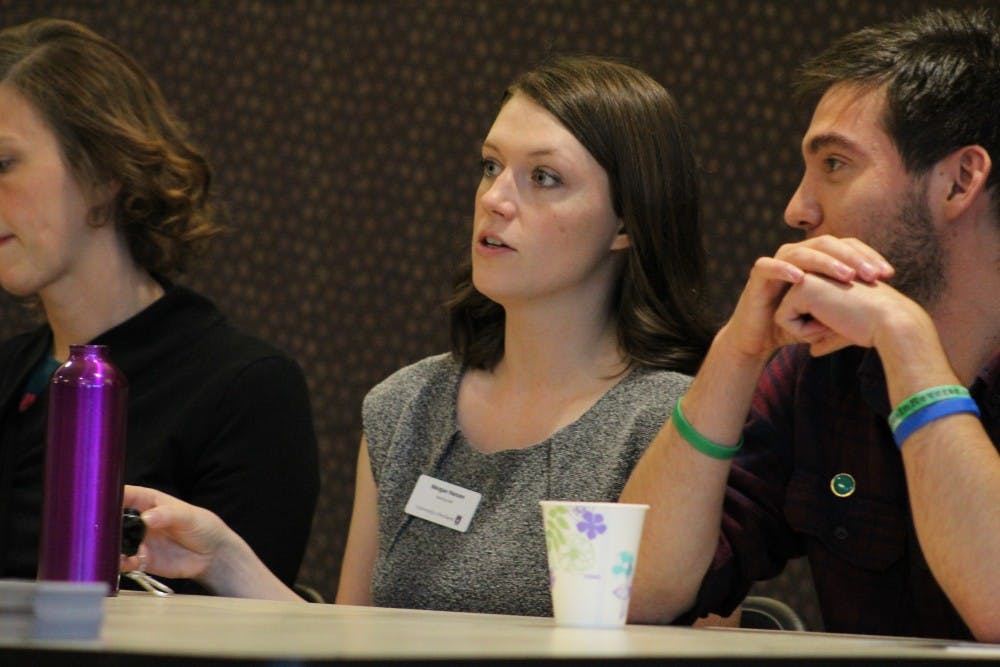The University of Portland Health and Counseling Center sponsored a screening of “The Hunting Ground” and a panel on sexual assault on Tuesday night. The showing of this film is an important conversation starter, especially because it criticizes the University of Notre Dame, our Holy Cross sister school, for the mishandling of sexual assault cases.
An important element of this conversation is the fact that the definition of consent according to University policy is muddy. The University of Portland needs to adopt a “yes means yes” definition of consent.
The University of Portland Student Handbook defines consent as, “informed, freely and voluntarily given mutual agreement understood by both parties and communicated by clearly understandable words or actions, to participate in each form of sexual activity.” It does note that, “consent will not be assumed by silence, incapacitation due to alcohol or drugs, unconsciousness, sleep, cognitive or mental incapacitation, physical impairment, or lack of active resistance.”
However, it still stands that it is unacceptable to say that "understandable actions" can mean consent.
In the film, a survivor describes her sexual assault: "I couldn't move … When you're scared, when you don't know what's happening to you, you just stay there and you hope that you don't die." There are a variety of actions in a sexual encounter that could be interpreted in various ways depending on the context of the situation - scratching, biting and hair pulling could all be signs of enjoyment or signs of self-defense. The difference? The presence or absence of a verbal, enthusiastic, freely-given “yes”.
Haley Pursell, director of services at Call to Safety (formerly Portland Women’s Crisis Line), says her organization sees and works with students from every university in Portland, including UP. She said often students come in feeling unsure whether they have actually been sexually assaulted because of the ambiguity of “mutually understandable actions.”
“People are taught that if they don’t fight back and they don’t scream no, it’s not rape, but they know that what happened to them was wrong,” Pursell said. “So often they reach out to us and we can provide some consent education.”
According to the National Sexual Violence Resource Center, at least 20 percent of college women fall victim to sexual assault and 90 percent know their attacker personally.
In 2014, the Rape, Abuse and Incest National Network reported that among all survivors of sexual assault, 80 percent of victims do not report to police or campus authorities. The women who choose not to report most often cite reasons such as "they believed it was a personal matter," "fear of reprisal," and "they believed it was not important enough to report.” No woman should be so unclear because of these policies as to what has happened to her own body, that she feels it is not important enough to report or that the University might not respond because it is a "personal matter".
UP’s definition of consent is in keeping with Oregon law.
Consent in Oregon is chiefly defined by those who are unable to give it: people under 18 years of age, people suffering from a mental disease or condition that renders them incapable of understanding another person’s intent, mentally incapacitated (generally by drugs or alcohol), or physically helpless meaning a person is unconscious or otherwise unable to communicate an unwillingness to act.
Additionally, Multnomah County District Attorney Dave Hannon clarified that according to Oregon law, forcible compulsion does not constitute a consensual sexual encounter, and that other evidence is considered on a case-by-case basis in court.
But still, we see something missing here: the definition of consent as the presence of a “yes”.
The University needs to adopt a policy in its student conduct code similar to California’s affirmative consent law.
Some may say that the request for clearer policies on consent is unrealistic, and that the state’s definition of consent should be good enough. But it is not. Campus hookup culture makes it even more pertinent to clearly define consent.
The University of Portland has a responsibility to its students, and should uphold policies that will protect and defend them. According to UP’s website, the University “values the development of the whole person...honors faith and reason as ways of knowing, promotes ethical reflection and prepares people who respond to the needs of the world and its human family.” All of this would become extremely difficult for a student suffering after being assaulted or having their assault dealt with poorly by the University because of faulty policies.
Sexual violence cannot be tolerated. Enduring trauma can be detrimental to a student’s mental health and can lead to suicidal ideation. The stress that ensues after a sexual assault can have negative effects on a person’s physical health, academic performance and social life. And seeing one’s abuser around campus could exacerbate this.
The University needs to make this change to show its support for victims, and its care for the entire campus community, as well as make it clear to potential perpetrators that no "gray area" will keep them from being justly punished. The only way to consent is to say yes with a clear mind, not inhibited by alcohol, drugs or the force of an abuser.
The University needs to hold its community to higher standards. It needs to require affirmative consent.








